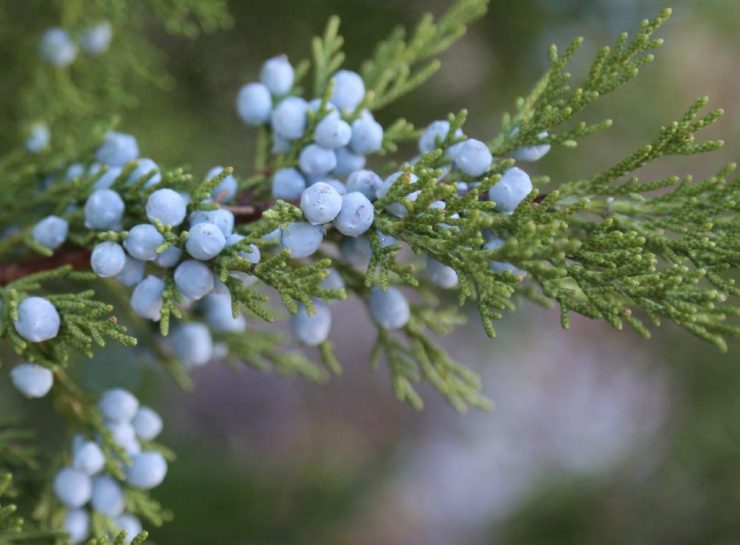Juniper (Juniperus communis), a coniferous shrub native to Europe, North America, and Asia, has been valued for its medicinal, culinary, and aromatic properties for centuries. Its berries, leaves, and essential oil are widely used in traditional medicine and modern wellness practices. Let’s explore the many benefits and uses of this remarkable plant.
1.Medicinal Benefits of Juniper
1.1 Supports Digestive Health
Relieves Indigestion: Juniper berries stimulate the production of digestive enzymes, helping to alleviate bloating, indigestion, and flatulence.
Detoxifies the Gut: Its antimicrobial properties can help cleanse the digestive system of harmful bacteria.
How to Use: Brew juniper berries into tea or use them as a spice in cooking to support digestion.
1.2 Promotes Kidney and Urinary Health
Natural Diuretic: Juniper berries increase urine production, helping to flush out toxins and excess fluids.
UTI Relief: Its antibacterial properties are effective in treating urinary tract infections (UTIs) and reducing inflammation in the urinary system.
How to Use: Drink juniper berry tea as a natural remedy for urinary health.
1.3 Boosts Immune Function
Rich in Antioxidants: Juniper is packed with antioxidants like vitamin C and flavonoids, which protect the body against free radical damage and boost immunity.
Fights Infections: The antibacterial and antifungal properties of juniper help combat common infections.
How to Use: Consume juniper tea or use juniper essential oil in aromatherapy to strengthen immunity.
1.4 Reduces Inflammation
Arthritis and Joint Pain Relief: The anti-inflammatory compounds in juniper help alleviate pain and swelling in conditions like arthritis and gout.
How to Use: Apply diluted juniper essential oil topically to affected areas for relief.
1.5 Improves Respiratory Health
Clears Congestion: Juniper essential oil helps to clear nasal passages and relieve symptoms of colds, bronchitis, and sinus infections.
How to Use: Add a few drops of juniper oil to a diffuser or steam inhalation for respiratory relief.
2.Culinary Uses
2.1 Flavor Enhancer
Spice in Cooking: Juniper berries are used to flavor meats, sauces, and marinades, especially in traditional European cuisine. Their slightly piney and citrusy flavor pairs well with game meats and stews.
Beverages: Juniper berries are a key ingredient in gin and can be used to infuse teas, cocktails, and syrups.
How to Use: Crush dried juniper berries to release their flavor before adding them to dishes or drinks.
2.2 Preservative
The antimicrobial properties of juniper make it a natural preservative for curing meats and prolonging shelf life.
3.Skincare and Beauty
3.1 Clears Skin
Fights Acne: Juniper’s antibacterial properties make it effective in treating acne and reducing skin blemishes.
Tones Skin: It helps tighten and rejuvenate the skin, giving it a youthful appearance.
How to Use: Add a few drops of juniper essential oil to a carrier oil or face wash and apply to the skin.
3.2 Scalp Health
Reduces Dandruff: Juniper oil helps combat dandruff and itchy scalp, promoting healthier hair.
How to Use: Mix juniper essential oil with shampoo or apply diluted oil directly to the scalp.
- Aromatherapy and Mental Health
4.1 Relieves Stress and Anxiety
Calming Aroma: The woody, fresh scent of juniper oil promotes relaxation and reduces stress.
How to Use: Diffuse juniper essential oil or add it to bathwater for a calming effect.
4.2 Boosts Mental Clarity
Improves Focus: The invigorating aroma of juniper stimulates the mind, enhancing concentration and mental clarity.
How to Use: Use juniper oil in a diffuser while studying or working.
5.Household Uses
5.1 Natural Air Freshener
Eliminates Odors: The refreshing scent of juniper oil neutralizes odors and purifies the air.
How to Use: Use juniper oil in a diffuser or make a natural spray by mixing it with water and vinegar.
5.2 Insect Repellent
Deters Pests: The strong aroma of juniper keeps mosquitoes, moths, and other insects away.
How to Use: Place crushed juniper berries in sachets around the house or mix juniper oil with a carrier oil and apply it to the skin as a natural bug repellent.
6.Traditional and Spiritual Uses
Purification: In some cultures, juniper is burned as incense to purify spaces and ward off negative energy.
Spiritual Protection: It is believed to provide protection and clarity in spiritual practices.
How to Use: Burn dried juniper branches or berries for cleansing rituals or meditation.
7.Precautions
Allergies: Some people may experience allergic reactions to juniper, so it’s important to test it on a small area first.
Pregnancy and Kidney Conditions: Juniper should be avoided during pregnancy and by individuals with kidney disorders, as it can overstimulate the kidneys.
Essential Oil Use: Always dilute juniper essential oil with a carrier oil before applying it to the skin.
Juniper (Juniperus communis) is a versatile plant with a rich history in traditional medicine, cooking, and wellness. From supporting kidney health to improving digestion and skincare, juniper offers a wide range of benefits. Whether you use it as a spice, essential oil, or tea, this plant’s healing and aromatic properties make it a valuable addition to your health and lifestyle routine.






Add comment